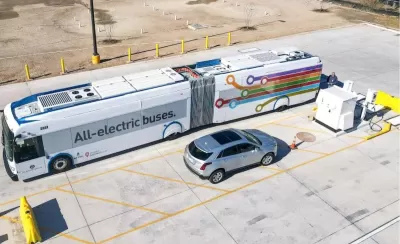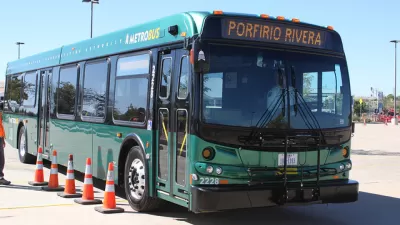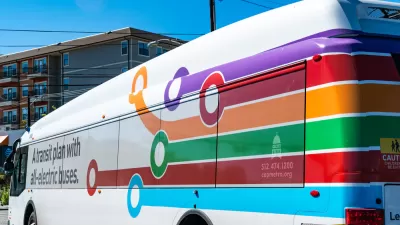Technology problems, short ranges, and supply chain issues hinder Cap Metro’s ambitious electrification plan.

Austin’s Capital Metro is pausing its ambitious plan to shift to an all-electric transit fleet, reports Nathan Bernier for KUT News.
Although voters approved funding for an all-electric transit system through the 202 Project Connect, Cap Metro officials are citing issues with the technology, including a significantly shorter range, as the cause the reversal. “Data obtained by KUT through the Texas Public Information Act revealed CapMetro's battery-electric buses are far less reliable than their diesel counterparts. E-buses had mechanical failures on average every 1,623 miles over the last year — less than half the typical distance between failures for the fleet as a whole.”
The two companies contracted by Cap Metro to deliver the electric buses also faced financial troubles and supply chain issues, with one going out of business. Currently, Cap Metro operates 23 electric buses out of a fleet of 402, with 87 buses on order. “Capital Metro now argues that having a reliable transit service, even with diesel buses, is better for the city and the environment than less reliable public transit with an all-electric fleet.”
FULL STORY: CapMetro stops shift to all-electric bus fleet

Planetizen Federal Action Tracker
A weekly monitor of how Trump’s orders and actions are impacting planners and planning in America.

Congressman Proposes Bill to Rename DC Metro “Trump Train”
The Make Autorail Great Again Act would withhold federal funding to the system until the Washington Metropolitan Area Transit Authority (WMATA), rebrands as the Washington Metropolitan Authority for Greater Access (WMAGA).

DARTSpace Platform Streamlines Dallas TOD Application Process
The Dallas transit agency hopes a shorter permitting timeline will boost transit-oriented development around rail stations.

Parks: Essential Community Infrastructure — and a Smart Investment
Even during times of budget constraint, continued investment in parks is critical, as they provide proven benefits to public health, safety, climate resilience, and community well-being — particularly for under-resourced communities.

Porches, Pets, and the People We Grow Old With
Neighborhood connections and animal companions matter to aging with dignity, and how we build can support them. Here’s a human-scale proposal for aging in place.

Single-Stair Design Contest Envisions Human-Scale Buildings
Single-stair building construction is having a resurgence in the United States, where, for the last several decades, zoning codes have required more than one staircase in multi-story housing developments.
Urban Design for Planners 1: Software Tools
This six-course series explores essential urban design concepts using open source software and equips planners with the tools they need to participate fully in the urban design process.
Planning for Universal Design
Learn the tools for implementing Universal Design in planning regulations.
City of Charlotte
Municipality of Princeton
City of Camden Redevelopment Agency
City of Astoria
Transportation Research & Education Center (TREC) at Portland State University
US High Speed Rail Association
City of Camden Redevelopment Agency
Municipality of Princeton (NJ)




























